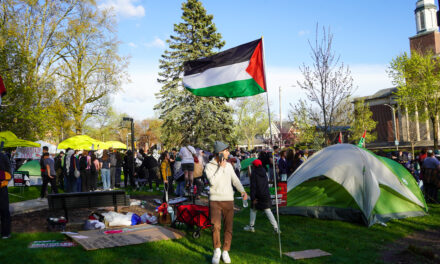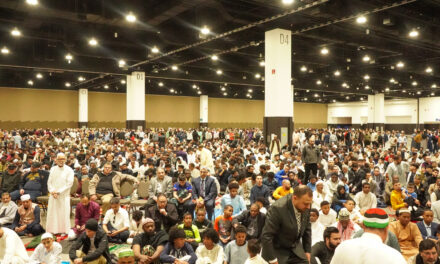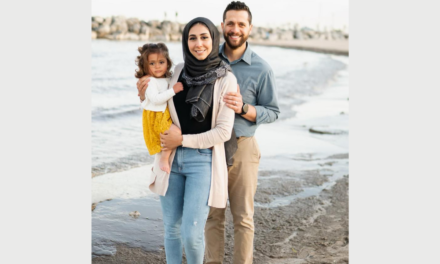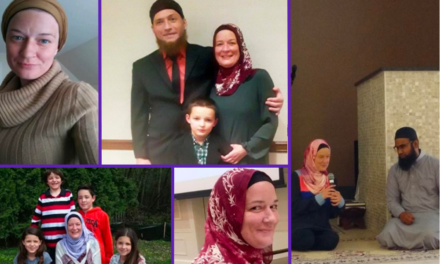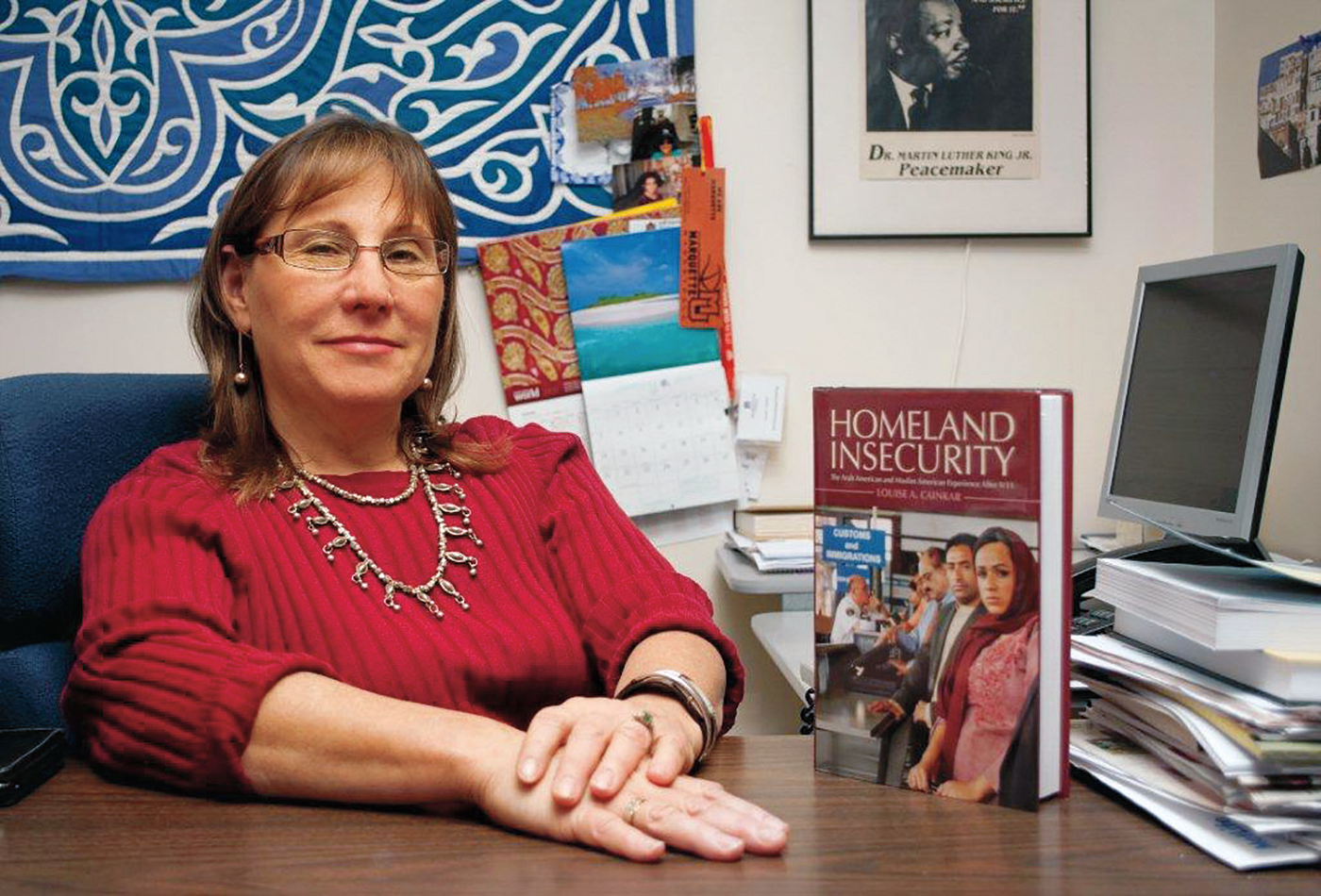
Louise Cainkar, Ph.D., poses with her 2009 book, “Homeland Insecurity: The Arab American and Muslim American Experience After 9/11.” It’s publication helped establish her as the nation’s leading scholar of Arab and Muslim Americans.
Community and political organizers, school teachers and university professors, scholars and activists seeking information about Arab Americans and Muslim Americans will quickly encounter the work of scholar Louise Cainkar, Ph.D., a Marquette University professor of Sociology and Social Welfare and Justice, and a Chicago native.
“She’s an integral part of the academic underpinnings of the Middle Eastern, Arab and Muslim communities, not just in Chicago but throughout the country,” said retired judge, the Hon. William Haddad, Cook County’s first Arab-American circuit judge. The founder of the Arab American Bar Association of Illinois and chair of AMVOTE (American Middle East Voters Alliance) said, “I’ve relied on her for many things I’ve done. Her research is impeccable.
“Dr. James Zogby, founder of the Arab American Institute, also relies on her research,” Haddad added. “With her zeal for digging in and learning more about our community, she creates resource information for the rest of us to use.”
Approaching her 20th year at Marquette University, Dr. Cainkar’s impact is deep and wide. Through scholarship, teaching and leadership, she has become a rare resource for anyone seeking to understand the Arab American and Muslim American experience in the United States.
A courageous scholar
Cainkar’s 26-page curriculum vitae lists hundreds of book chapters, research papers and speaking presentations she has done, as well as dozens of awards, including the prestigious Carnegie Corporation Scholar Award for her work on Islamic revival among second generation Muslims in the United States and a Fulbright research award early in her career that took her to Jordan in the 1990s to study forced migrations from Kuwait after the first Gulf War.
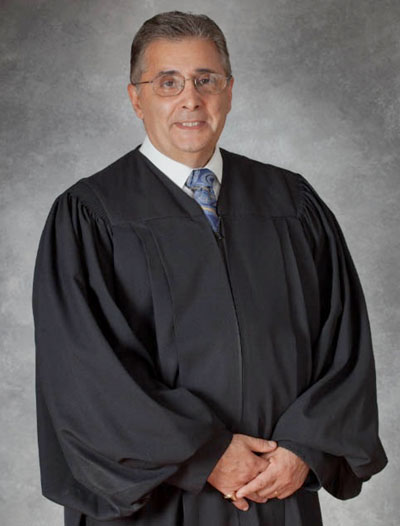
Hon. William Haddad, Cook County’s first Arab-American circuit judge, and Louise Cainkar, Ph.D., are working together to establish MENA (Middle East and North African) Americans as both a census category and a business enterprise minority, giving them equal footing with other minority business owners in bidding on government contracts.
Prior to that, Cainkar earned a doctorate in sociology at Northwestern University with her dissertation, titled “Palestinian Women in the United States: Coping with Tradition, Change and Alienation.”
Recognitions of Cainkar’s work come from beyond academia’s ivory towards. CAIR-Chicago, a not-for-profit Muslim civil rights organization, honored Cainkar in 2010 with its Courage in Research Award “for her academic research which focuses on addressing the fundamental human issues of well-being and social justice.” Her book, Homeland Insecurity: The Arab American and Muslim American Experience after 9/11 came out in 2009.
“When Cainkar decided to write that book, she was challenging the norm,” said Muslim Women’s Coalition founder Janan Najeeb, who was in the audience when Cainkar received the award from CAIR-Chicago. “The country was so Islamophobic. To write about the racism and prejudice Muslims and Arabs were encountering was not popular at the time. No one else was addressing it.”
One aspect that makes her research so significant is its relevance to the times, said Reema Ahmad, a political strategist and community organizer from Greenfield. In 2010, Ahmad led CAIR-Chicago’s Government Relations Department.
It was a census year and Ahmad’s team was encouraging people in the Arab and Muslim communities to fill out the census “so we could be counted and work on getting better political representation. We were trying to make the case to our community that representation matters, that we may not be getting the services and support we deserve,” she recalled.
“Some of Dr. Cainkar’s research looked at the barriers to civic engagement in Arab and Muslim communities. Nowadays, more research exists,” Ahmad continued. “But at the time, she was a forerunner, really way ahead of other scholars in looking at Arab Americans and Muslim Americans.
“And unlike some other scholars at the time, she did not take an orientalist approach that treats these communities as perpetual foreigners. How much more difficult our work would have been without her research! The fact that Dr. Cainkar makes sure her work is relevant and useful to people trying to improve the lives of the communities she studies is a tremendous asset.”
Engaging with Wisconsin’s Muslim and Arab communities
In 2006, Cainkar joined Marquette University and began engaging with Wisconsin’s Arab and Muslim communities, while maintaining strong ties in Illinois. (Since 2006, she splits each week between her Chicago home and her apartment in Milwaukee.)
In 2019, Najeeb was a community partner with Cainkar on research published in the Journal of Middle East Women’s Studies: “Taking on Hate: Muslim Women build a Community-Driven Hate Watch.” Najeeb said she was pleasantly surprised to find her name prominently featured with Cainkar’s at the top of the article.
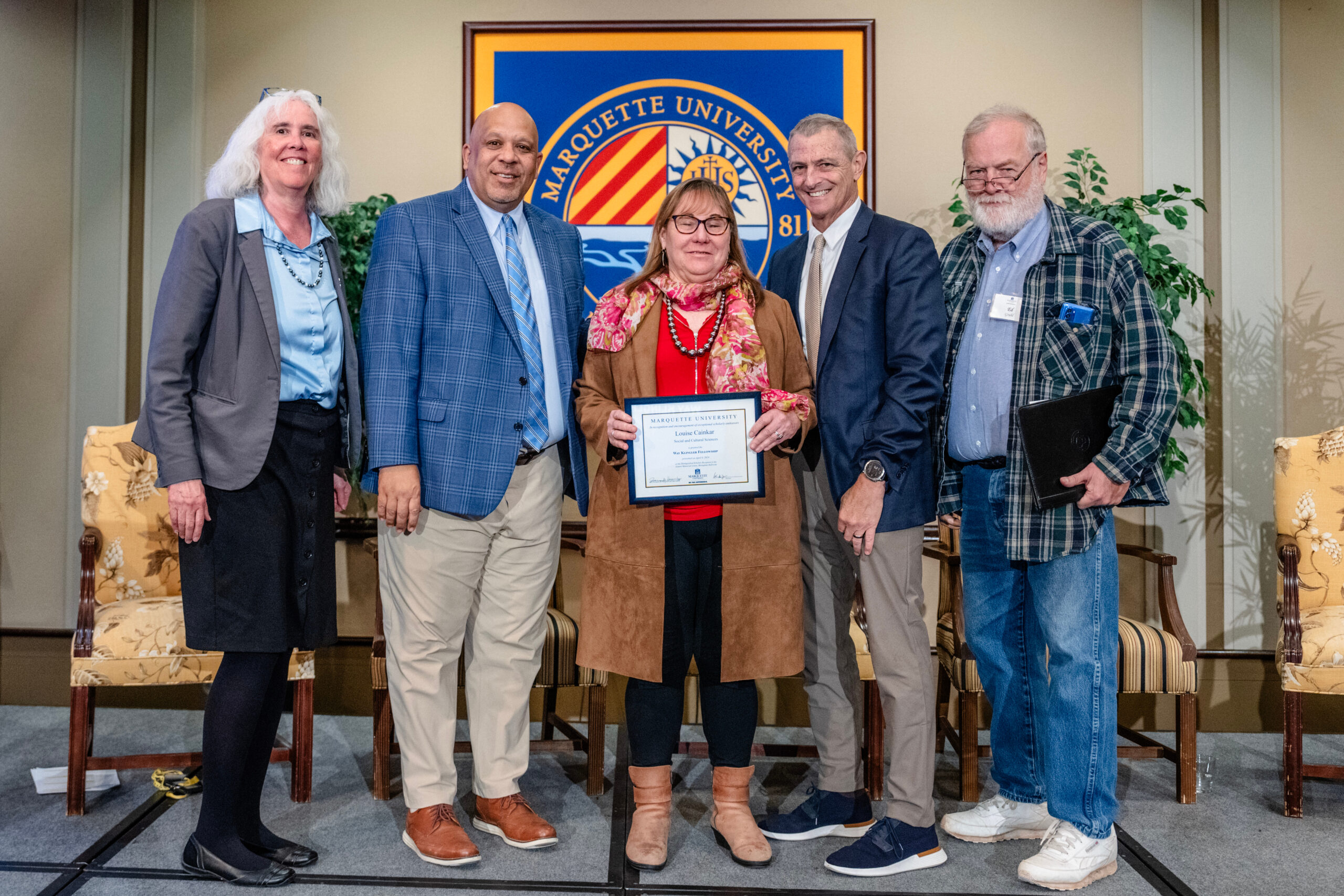
Louise Cainkar, Ph.D., was honored by Marquette University in 2024 as a Distinquished Scholar.
“She was definitely the academic on this but we brought in the people and the information she needed,” Najeeb said. “Over the years, I’ve been involved in projects with different professors where they take complete authorship without crediting our participation.
“One thing I have to say about Louise is she is incredibly ethical. Every step of the way, she would consult with me. We would talk back and forth about issues. She is a diligent scholar who wants to make sure her research is accurate,” Najeeb surmised. “I have a lot of respect for how she does her work. She is the utmost professional.”
Cainkar’s involvement with Wisconsin’s Arab and Muslim communities also gives authenticity to her teaching, Najeeb said. “I’ve seen professors at different universities teaching about Arabs and Muslims without making any effort to bring in people from those groups who can answer students’ questions or take students out into the community to meet them.
“Louise has invited me and others to speak to her classes and brings her students to our Islamic Resource Center, since it opened 15 years ago,” Najeeb said. “She takes them to mosques and to Michigan, to Dearborn and Detroit where there’s a significant Arab population. She wants to really immerse them in the full experience. They aren’t just getting information from her but they’re experiencing things themselves and formulating their own opinions.”
An impactful teacher
MU named Cainkar a 2025 Ignatian Educator of Distinction, a “public recognition of a person’s commitment and competence in animating the Jesuit tradition of academic excellence.”
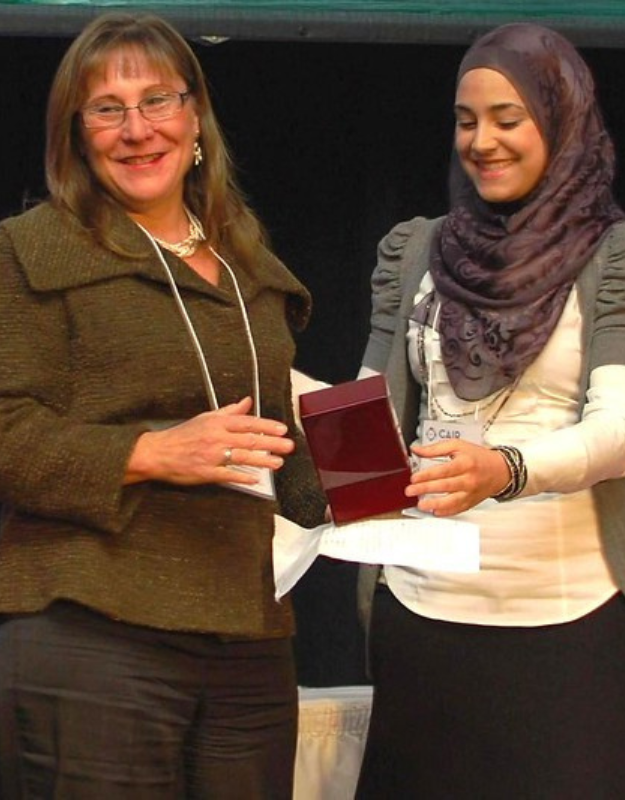
Reema Ahmad, right, presented Louise Cainkar, Ph.D., with CAIR-Chicago’s “Courage in Research Award.” Cainkar’s book “Homeland Insecurity” discussed discrimination against Arab and Muslim Americans, one of the first scholarly publications on the topic.
In addition to teaching courses that introduce undergraduate students to Arabs and Muslims, often for the first time, she teaches courses in sociology, social welfare and justice, research methods, faith-based activism and immigration and immigrant communities, among other classes.
As the director of Marquette’s Peace Studies Program, Cainkar has “built it into one of the largest and most vibrant interdisciplinary programs on campus,” said Patrick Kennelly, Ph.D., director of MU’s Center for Peacemaking. “Louise inherited a brand-new program that started out with just a handful of students. Now it regularly has enrollment of 20 to 40 students at a time (strong numbers for an interdisciplinary program).
“Louise shines in her ability to challenge students to think critically and in helping them understand how this program develops a career path,” Kennelly said. “She does this by working across campus with faculty in other disciplines. She put together an advisory committee that guides the program in ways students can connect to it.
“The other thing Louise does really well is work with the staff at the Center for Peacemaking so when a student is in Peace Studies, they participate in various social programing, discussion groups and lectures with guest speakers. The students really have a sense of community.
“Her student trip Engaging Muslims, Countering Islamophobia Immersion Experience is one of the Center for Peacemaking’s signature programs. Not only does Louise take the students there, she does a lot of prep with them before they so so the students aren’t just seeing things at a surface level,” Kennelly said.
She also developed many community, political and religious contacts in Dearborn and Detroit to create opportunities for her students to engage with leaders there.
“And she goes out of her way to fundraise to help cover the students’ travel expenses. She seeks external funding to offset their costs,” he added.
“She believes in the student experience. Louise thinks students should be at the center, and not only in the classroom. She’s constantly refining her teaching to integrate current events and different perspectives. She makes herself available to the students.
“Louise thinks in terms of creating the next generation of scholars and peacemakers. She sits on the board of the Wisconsin Institute for Peace and Conflict Studies, and she regularly organizes Marquette students to go to their annual conference and present so they can get a sense of what it means to be a scholar and contribute to the growth of knowledge.
“She has also organized the WIPCS conference, hosting it here at Marquette last spring, where it had one of their highest attendances ever. And she does all this without additional compensation.”
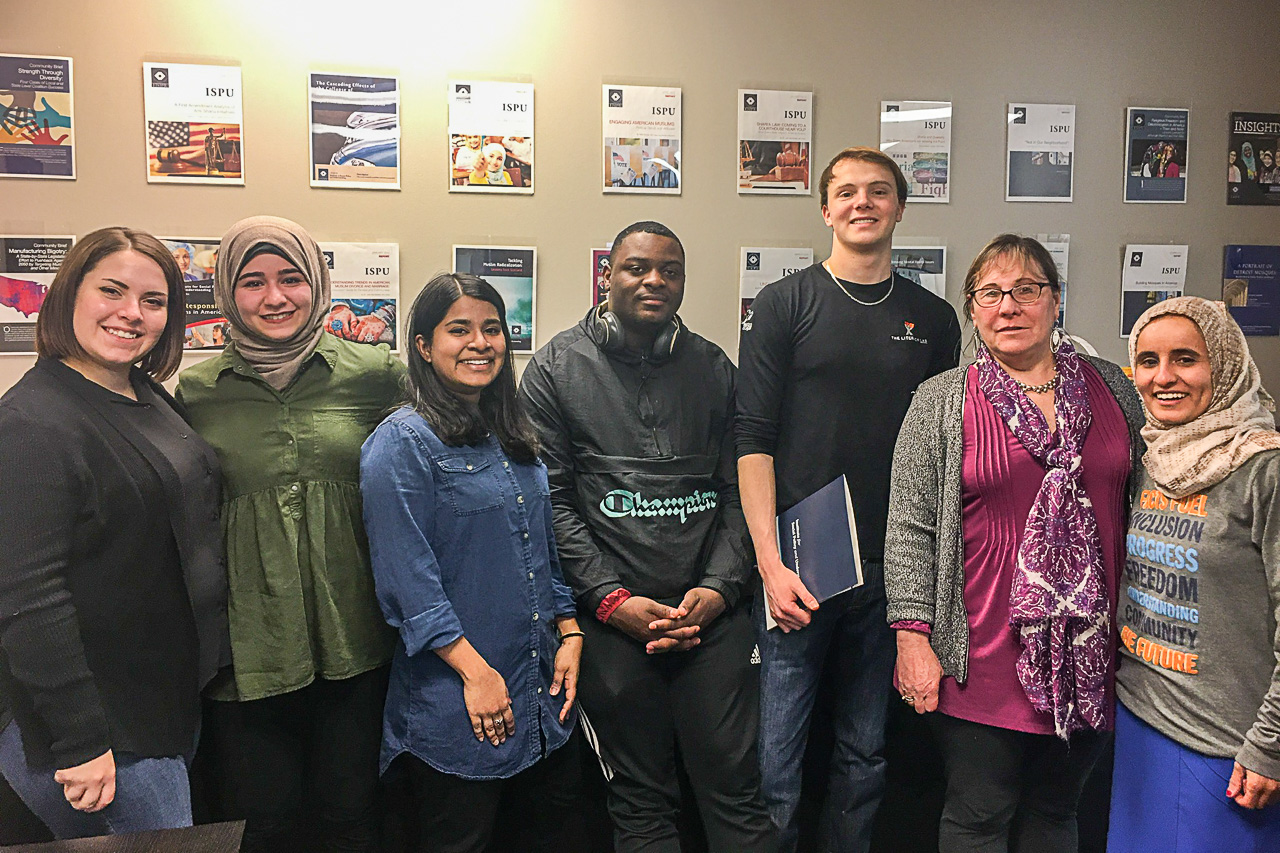
Louise Cainkar, Ph.D., leads the Marquette Center for Peacemaking’s four-day immersion experience in Michigan’s Arab community for undergraduate and graduate students.
Kennelly first met Cainkar more than 15 years ago. “She was one of the first faculty members I met when I started at Marquette (as a doctoral student), but she has been with the Center for Peacemaking since its inception, at the forefront of Peace Studies at Marquette,” he said.
“She was my advisor for my dissertation,” he continued. “What people don’t know is Louise is regularly mentoring Ph.D. students, not only from Marquette, but from other institutions around the country.
“When you look at the progression of her career, from a nonprofit executive to an academic, she has always made sure her work is contributing to uplifting folks who have either been oppressed or marginalized. Whether it was her work on the ground in Jordan, Kuwait, Iraq, Yemen or Palestine, Louise has always been saying, ‘What can we do to make sure all people’s human rights and dignity are upheld?’”
What’s she like?
To learn more about what Dr. Cainkar is like as a person, Wisconsin Muslim Journal asked a few people who know her well. Here are their answers:
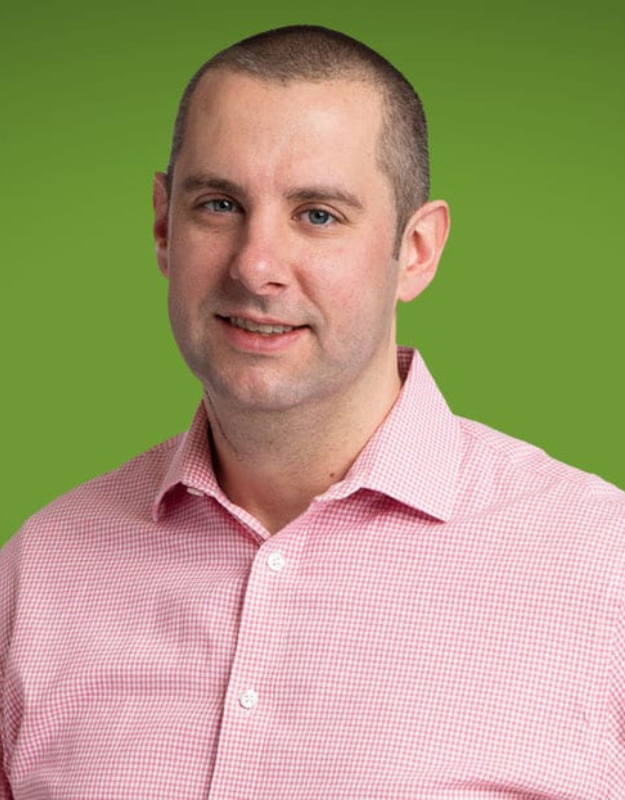
Marquette University Center for Peacemaking Director Patrick Kennelly first met Prof. Louise Cainkar when he came to MU as a doctoral student. She served the advisor for his dissertation.
MU Center for Peacemaking Director Patrick Kennelly: “Smart, that’s the Number One word that comes to mind. She is obviously a very accomplished academic, but she has such a wide range of interest. She’s an avid sports fan and loves basketball. She keeps up with what is going on in her community in Chicago and the diverse networks she runs in. She really values community and wants to connect with a wide range of people.
Muslim Women’s Coalition founder Janan Najeeb: “She’s a very down-to-earth person. You can sit with her and just have a regular conversation. She comes to Milwaukee on the train and doesn’t even bring a car with her. She is somebody that I’ve always found really interesting and delightful.”
Cook County Circuit Judge (retired) and MU alumni Bill Haddad: “Her zeal motivates so many people. I respect her unafraid academic approach to reveal information about discrimination against Arab Americans and Muslim Americans.”
Reema Ahmad, political strategist and community organizer: “She’s a leader. She is on the board of the Arab American Action Network, one of the social service and cultural organizations on the south side of Chicago.
“She was a professor at Marquette when I was an undergrad and the advisor of the Arab Student Association, which predated Students for Justice in Palestine, or maybe it was the Muslim Student Association. I was the president of both. She was really helpful. She was our ally.”
What makes her tick?
WMJ met Cainkar at Miss Katie’s dinner near Marquette for an interview. It is her go-to restaurant, in walking distance from her office. She sent a text to say she would need a few more minutes to get there; she had to finish a research proposal.
“She’s always writing or speaking,” Kennelly had said.
She sat down and ordered. She didn’t need a menu. And a casual conversation began.
WMJ: How is it teaching undergrads about Arabs and Muslims?
Cainkar: They’re curious and interested. Why would you take a class like that otherwise. But they don’t have a background in things like race and ethnic studies, or comparative religion, or history of the Middle East. I give them a map of the Middle East and North Africa. Most don’t have a clue where the countries are.
Even Arab American students don’t know a lot of the stuff. I go back to the Golden Age of Islam. We start there and they don’t know it. They probably don’t know about Black Muslims. We study that. We study gender in Arab culture and how it is portrayed in the U.S. media. They may not have thought about it. Just because they’re raised in it doesn’t mean they’re well informed. The topics provoke a lot of curiosity in them, too.
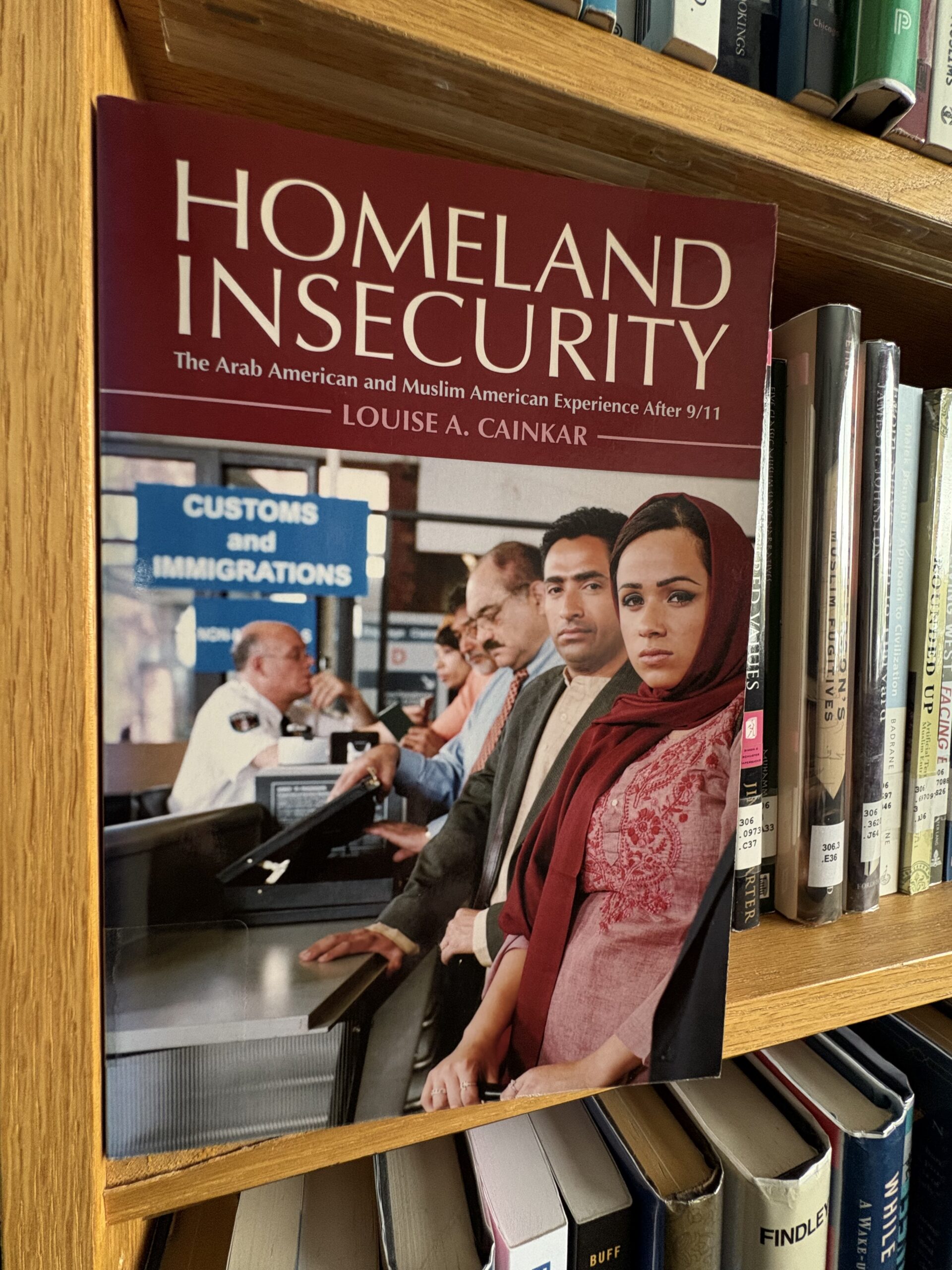
Dr. Cainkar’s first book, “Homeland Insecurity: The Arab American and Muslim American Experience After 9/11” is available at the Islamic Resource Center Library, 5235 S. 27th St., Greenfield.
WMJ: What research are you working on now?
Cainkar: I just wrote a proposal for a study of interpersonal Palestinian silencing. I don’t mean the silencing we all know about by the media and the government, at the institutional level.
I’m talking about from the time you wake up in the morning to the time you go to sleep in your daily life. Where can you talk about things that are on your mind? We’re talking about Gaza here. Where can you not do that?
I’m back to where I started my career, studying Palestinian Americans. I have written more about Palestinian Americans than anybody in this whole country and maybe in the world. I find that somewhat unfortunate, actually, for the Palestinians.
I’m doing interviews now with Palestinians in Chicago. It’s easy for me. People know me there and they trust me. I’ve written so much about them and they all know I’ve never harmed anyone.
WMJ: What have you found so far?
Cainkar: That the workplace is the main place where people cannot speak. I give them five humanitarian crises and the only one they can’t talk about is Palestine. For some reason, it is coded as political, not humanitarian.
WMJ: How did your interest in studying Arab Americans and Muslim Americans begin?
Cainkar: It started with a trip to Morocco when I was a grad student with a fellow grad student. It was so interesting! It was fascinating! When I came back, I went to the library at Northwestern and started reading books about the Arab world, so to speak. When I did, I thought they were racist.
I didn’t know anything. I didn’t even know any Arabs. But I knew something was wrong with the books.
I talked to one of my teachers. I told her about my interest and she said, Go out and do some interviews. Come back and we’ll talk. So I did.
Cainkar did her own research, learned firsthand and started tearing down stereotypes. That’s what she’s been doing ever since.
